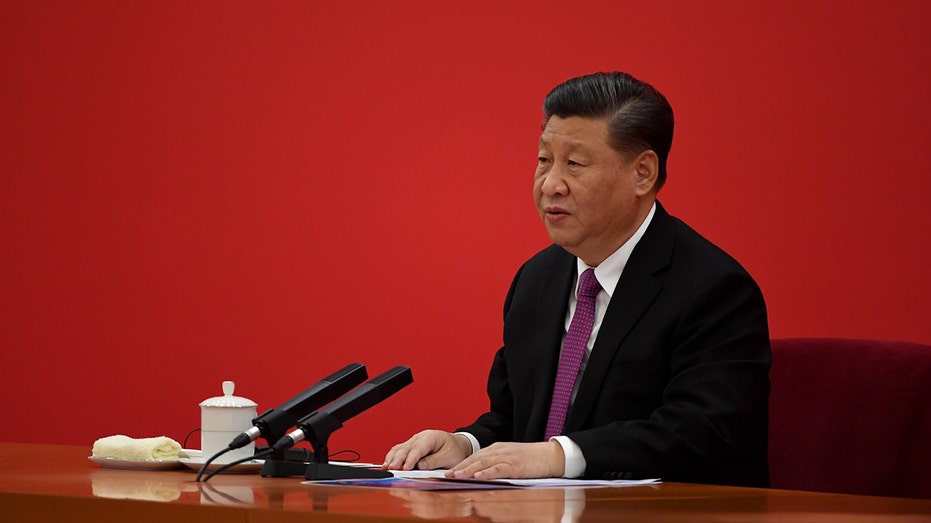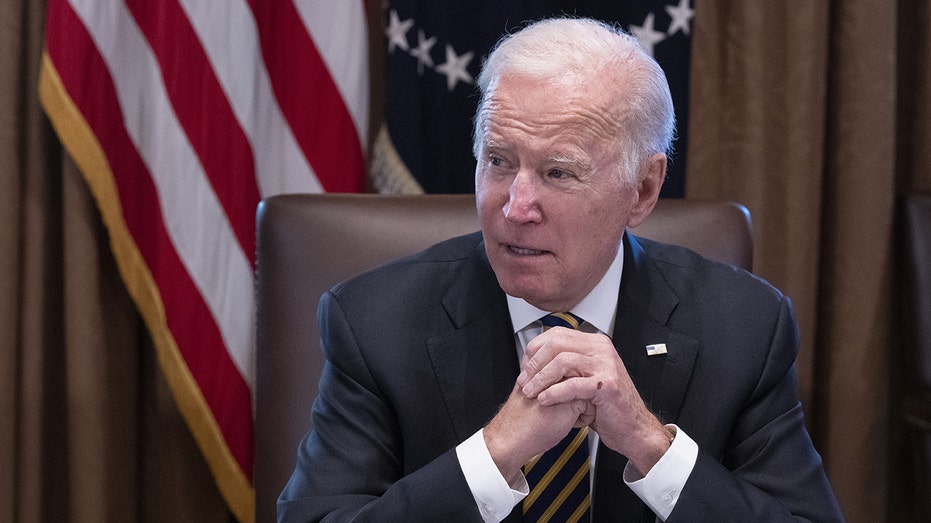Biden and Xi Jinping set modest expectations for Monday meeting
This will be Biden and Xi's third meeting since US president took office
Fox Business Flash top headlines for November 15
Check out what's clicking on FoxBusiness.com.
President Biden’s China policy, a mix of confrontation and cooperation, will face a stress test when he meets virtually Monday evening with President Xi Jinping, as the leaders attempt to build on signs of easing hostility.
The bilateral conversation will be their third since Mr. Biden took office in January and comes as the Chinese leader extends his rule over the world’s most populous nation. The sides set modest expectations and don’t anticipate concrete outcomes. Broadly, Mr. Biden and his team have settled on a strategy of managing the relationship through what they call "intense diplomacy."
"The Biden administration is not trying to change China through bilateral engagement—we don’t think that’s realistic," a senior administration official said. "We’re trying to shape the international environment in a way that is favorable to us and our allies and partners."
TOP BIDEN ECONOMIC ADVISER SAYS $1.75 T SPENDING BILL WILL REDUCE INFLATION

Chinese President Xi Jinping speaks with Russian President Vladimir Putin via a video link, from the Great Hall of the People in December 2019 in Beijing, China. President Xi will meet with Biden today. (Noel Celis - Pool/Getty Images / Getty Images)
Building off a surprise joint declaration in Glasgow last week pledging cooperation on a transition to cleaner energy, Mr. Biden is expected to seek accord on issues including nuclear proliferation and health amid the Covid-19 pandemic. The White House views him as entering Monday’s meeting with a strong hand. Earlier in the day, Mr. Biden is scheduled to sign a nearly $1 trillion bipartisan infrastructure bill that he views as essential in keeping up with China’s own domestic investments.
Mr. Xi, meanwhile, is focusing his U.S. strategy on damage control rather than resetting the relationship, according to the people with knowledge of Beijing’s thinking. Mr. Xi’s priority is to ensure that the road is smooth, and he is willing to reopen channels of communication with Mr. Biden to prevent military conflict, they say.
"We are at a point where there is some shift under way," said Danny Russel, a former senior official in the Obama administration now with the Asia Society Policy Institute, a nonpartisan think tank. "Both leaders are dissatisfied with the state of the relationship. They are both very mindful that some type of incident could occur that would create a problem that neither can afford right now."
The two sides have plenty of contentious issues to discuss, from Taiwan to trade. On the call, Mr. Biden will raise concerns over human rights, for which the U.S. has leveled sanctions, and Chinese economic practices, officials said.
Since Mr. Biden took office, the U.S. has strengthened security partnerships in the Indo-Pacific region, including a contentious submarine deal signed with the U.K. and Australia in September. The deal, initially overshadowed by a diplomatic row with France, showed that some allies, like Australia, which had hedged their bets in the region, are more firmly aligning with the U.S., officials said.
U.S. business leaders are eager for optimistic signals on trade and want Mr. Biden to address broader issues, including China’s industrial subsidies. The president has largely kept in place Trump-era tariffs, and he is not expected to offer concessions on Monday. But his administration has been engaging with Beijing, and both sides said talks have been positive.
"While expectations are somewhat modest for the virtual Xi-Biden summit, we need constructive pragmatism and demonstrative steps that will stabilize relations, manage tensions and create room for more tangible progress going forward," said Myron Brilliant, executive vice president and head of international affairs at the U.S. Chamber of Commerce.
A major sticking point remains Taiwan, the self-governed democratic island of 20 million people that China claims as part of its territory. Long a diplomatic flashpoint in the bilateral relationship, over the past year Taiwan has become a military one.
Beijing’s intentions with Taiwan amount to the most urgent concern for Washington. Mr. Xi will seek clarity on the administration’s policy toward Taiwan, people with knowledge of Beijing’s thinking said.
CLICK HERE TO READ MORE ON FOX BUSINESS

U.S. President Biden speaks during a Cabinet meeting at the White House on Nov. 12, 2021. ( Chris Kleponis/CNP/Bloomberg via Getty Images / Getty Images)
Mr. Biden will affirm that the U.S. fundamental "one-China" policy hasn’t changed, a senior administration official said. Washington takes no official stand on Taiwan’s sovereignty and adopts a stance known as "strategic ambiguity" on whether it would defend Taiwan in the event of military action by mainland China. Mr. Biden has recently, though, made statements about defending Taiwan that irked Beijing and led to clarifications from U.S. aides that the policy remains in place.
The U.S. conducts a robust arms sales program with Taiwan, and The Wall Street Journal in October reported the U.S. has quietly deployed a small group of troop advisers to Taiwan for at least a year.
Beijing has signaled that it could take the democratically-controlled island by force to unify it with mainland China and has alarmed Taiwan and U.S. officials by sending waves of warplanes near Taiwan in shows of force. U.S. officials estimate that such a scenario could happen within five years, but others believe a miscalculation by any side could trigger a crisis sooner.
Beijing has little motivation to compromise on the core issues at the heart of the strained bilateral ties, including human rights, territorial disputes and China’s economic practices, they added.
CLICK HERE TO GET FOX BUSINESS ON THE GO
Part of the calculus is Beijing’s belief that Mr. Biden, facing waning popular support, is being hamstrung by a Congress looking to advance legislation that could reorient America’s China policy toward competition from one centered on engagement. The $250 billion U.S. Innovation and Competition Act, passed by the Senate in June, is aimed at making the American economy more competitive against China by boosting government spending on technology research and development.
"It’s a different China," said Robert Ross, an expert on U.S.-China relations at Boston College. "The Chinese are saying, ‘Fine, you want to posture with your hard line, we’ll wait you out.’ It’s a very different policy-making environment."
This article first appeared in the Wall Street Journal




















